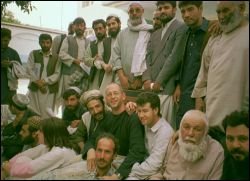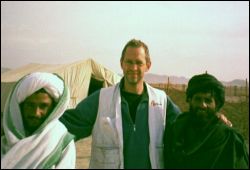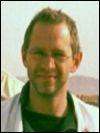Diderik van Halsema, Project Coordinator in Kandahar, Afghanistan was forced to evacuate his team from southern Afghanistan in April, 2003, when increasing violence against foreigners made it impossible to stay.
The phone call comes as I'm putting the final touches on a document proposing an MSF visit to another big camp full of internally displaced Afghans in one of the southern provinces of Afghanistan.
The message is devastating: an International Committee of the Red Cross (ICRC) volunteer has been shot dead just outside Kandahar. For a second I stop thinking - then I slowly begin to realize that everything is about to turn upside down.
For ten months now I have been working in southern Afghanistan. My team is based in Kandahar, roughly translated as "the sweet city." We started during a period full of optimism, ideas and hope.
After a short interruption during the war in the last months of 2001, MSF restarted its program in Kandahar. Our focus is treating infectious diseases and providing medical aid to a part of the hundreds of thousands internally displaced people still roaming the deserts and urban areas of the south. These people, mostly ethnic Pashtuns, have been seriously affected by the devastating drought of the past years and the ethnic tensions that have risen as a consequence of the war, in which Tajiks and Uzbeks take out residual frustration and anger on the ethnic group they associate with the Taliban.
It's early April now and the temperature is rapidly rising in anticipation of another scorching summer, when the temperature will top 120 degrees Fahrenheit.
Yes, officially there is still a war going on, as Coalition forces chase Taliban and Al Qaeda leftovers, but the international community pledged billions of dollars.

|
"Afghanistan will not be left alone," was the promise made.
"The world will assist with food, shelter, medical care, education and security."
"The world will help Afghanistan to rebuild and reconstruct."
Promises made with beaming faces from the expensive conference rooms of donor states and institutions.
The optimism is now rapidly slipping away: Iraq dominates the headlines in the world media; Afghanistan is far from stable; the post Taliban honeymoon is over, as regular fighting, random violent incidents, and the ongoing military campaign by Coalition Forces sow confusion among the population and increased crime. Regional warlords seem to gain more and more strength, and once again in Aghanistan a minority of self-interested people pursue their own political agenda, in the process, ruining the future of millions of their fellow citizens.
The international community pays lip service to Afghanistan but the promised money is barely coming in. Only a fraction finds it way to where it should go: the people of Afghanistan. The world now focuses on another country that needs to be rebuilt: Iraq. Afghanistan tumbles of the agenda.
Of the people of Afghanistan, the Pashtun live mainly in the east and south of the country. They are tough, fiercely independent and proud, a people for whom family and tribe come first. Their coping mechanisms are incredible, but behind the toughness there is a seemingly unlimited hospitality and an astounding friendliness. The majority want nothing more than to lead a decent life following centuries-old traditions, with an emphasis on culture and tribal influence.
But they are caught in a spiral of international politics, local feuds, and unfulfilled promises by the international community. They're ordinary people, struggling for survival and paying the price again for the interest of a few.

|
Our Afghan team-members sense that there is bad news looming. When they hear about the death of the ICRC volunteer, followed by the deaths of two American soldiers - the culmination of weeks of increasing security incidents, in which landmines randomly explode killing innocent civilians and a rocket propelled grenade flies directly over our compound - they know that hard decisions need to be made. We need to find the fine and tenuous balance of keeping the programs running while guaranteeing the safety of the international and national staff.
After some days of talking and gathering as much information as possible, we decide the inevitable: to withdraw the non-Afghan volunteers from Kandahar. The recent violence is so random - when you think to look left it comes from the right, when you look right it comes from the left. Or, in this case, it stabs us all fully in the back. Foreigners have become a specific target. Most aid workers leave, only a few will stay.
Dealing with terrorism is something that the humanitarian world also has to struggle with, but safety comes always first. In the frantic and hectic days that follow we'll hand over the project to the Afghan staff. They'll get more responsibilities, with supervision from MSF in Herat, a city in western Afghanistan. They'll have to keep the medical assistance going to 30,000 internally displaced people in Zhare Dasht ("yellow desert"), an hour drive west of Kandahar, and to the infectious disease ward of Mirwais Hospital in the city.
The staff is very capable and show remarkable professionalism towards this new situation. Some of them have gone through this before, fleeing the bombing of late 2001, working under intense pressure during the Taliban in the late 90's, fleeing the Mujahadeen in the early 90's, fleeing the Russians in the eighties. Some families have paid a devastating price for their survival.
Luckily, MSF has the means to adapt quickly to this new situation. The logistical and medical supply lines stay open; there will be daily contact for advice and follow up. Each of us gets new responsibilities to do our utmost not to leave our patients alone.
Yet, the goodbye party is somber. No one wants to part like this. Normally a party with the staff ends in dancing. Not today.
After ten months of working closely together, day in day out, the same situation which has plagued this country asserts itself once again: an empowered minority threaten to ruin the future for those who want what, understandably, everyone around the world wants: a bit of dignity and stability in their lives.
The recent violence is so random - when you think to look left it comes from the right, when you look right it comes from the left. Or, in this case, it stabs us all fully in the back. Foreigners have become a specific target.
Diderik van Halsema




